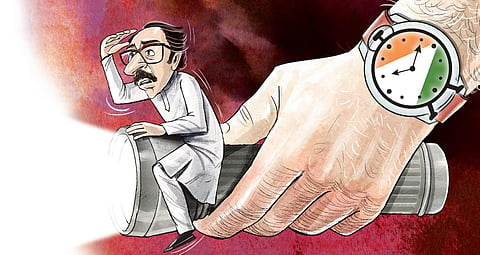

The coronavirus is bringing out the best and worst in people, particularly our politicians. All of last week a nasty spat has been brewing between the BJP and Shiv Sena in Maharashtra, between the friends of former chief minister Devendra Fadnavis and the current CM Uddhav Thackeray. As the enormity of the pandemic began to dawn on the nation, friends of Fadnavis, who has still not been able to reconcile to his loss of office, started a trend on Twitter with the hashtag #Maharashtra- NeedsDevendraFadnavis.
They implied that Thackeray was incompetent and incapable of handling such a crisis, and was messing up the management and containment of the virus. Friends of the CM, including some of his Cabinet ministers, jumped into the fray and quickly went for Fadnavis’s jugular, saying he had handled the successive droughts in Maharashtra badly (the number of farmers’ suicides increased exponentially) and adding he had been completely overwhelmed by the floods in parts of the state last year (many died, lost homes and farms, and were not compensated). Among these supporters were some NCP ministers who swung to Thackeray’s defence, underscoring the commendable job the CM was doing under the circumstances of the multiple stents in his heart and medical advice not to put himself under stress.
Yet there were daily notifications from his office and like the Kerala CM and his health minister, Thackeray was frequently appearing before the media— something Fadnavis was not known to do during a crisis— along with his own health minister Rajesh Tope of the NCP to update the people on the measures undertaken by his government as the infection grew every day. After Prime Minister Narendra Modi’s Tuesday address locking down the whole nation, there was panic over food and essential services. Thackeray calmly took to social media to post his own address telling people that these services would not be stopped in the state, assuring them there were enough food stocks in government godowns to tide over the crisis and asking the police, amid reports that they were harassing people on the streets, to deal with them compassionately in these extraordinary times.
Thackeray, a complete greenhorn in electoral politics, has indeed surprised even many of his diehard critics by the manner in which he has been handling the crisis. But he has some help. He is, after all, being guided in his efforts by none other than the best disaster management expert in the country—NCP boss Sharad Pawar. Which also explains why he is being defended more by the NCP than the Sena. During his term as chief minister, Pawar had handled more than one disaster with consummate skill. When the serial bomb blasts occurred in Mumbai in March 1993, Pawar was in his office and sprung to his feet to rush to the nearest window. He could see some of the commotion at the Air India building at Nariman Point, one of the targets of the 12 blasts, and the police arriving with their dog squads.
Yet he did not sprint across those few metres to take stock himself because his reasoning was that if the policemen saw their chief minister on the scene, their attention would be instantly diverted to protecting the VIP rather than rescuing the victims. So he waited patiently until the police commissioner arrived at Mantralaya, the state secretariat, to brief him about the disaster. As he told me years later in an interview, the Mumbai police had instantly fathomed who could be behind the attacks and why. So knowing that this was building to a potentially dangerous communal situation, he went on Doordarshan and calmly lied about the number of blasts that had happened in the city.
We had counted 12 but when Pawar claimed that there had been a 13th blast—at Masjid Bunder, a predominantly Muslim ghetto— and that some Tamil Tigers had left some clues behind that the cops were following up, it left reporters scratching their heads and running around in circles to trace the remnants of that non-existent blast. Of course, no one could find any traces of a recently bombed building or the LTTE because no 13th blast had happened and no Sri Lankan Tamil had targeted Mumbai. The wild goose chase that Pawar sent reporters on that day was to prevent a communal conflagration by pretending Muslims had been as much a target and the perpetrators were foreign entities no one would know how to pin down or retaliate against.
The blast happened on a Friday, I recall, and Pawar got the stock market, another target, standing on its feet, open for business at the usual hour on Monday morning to give the shaken city a semblance of normalcy. Soon after, he had to face one of the most devastating earthquakes of the century in Latur in South Maharashtra and his compassionate handling of that too is now the stuff of legend. Even here he allowed officials to take initial stock, slept in a bullock cart one night, allowing officers to take rooms in the government guest house and exhorted them not to look down upon the devastated victims and share in their tragedy.
His skills were recognised by then PM Atal Bihari Vajpayee in 2001, who put Pawar in charge of the national disaster management agency after the Kutch earthquake in Gujarat—a rare honour for an opposition leader. With such an experienced hand guiding him, it is no wonder that the Maharashtra CM is handling the Covid crisis well. Apart from surprising his critics, Thackeray, between the CAA protests that were handled with equal understanding and the coronavirus response, has won the hearts of many common people too.
SUJATA ANANDAN
Senior journalist and political commentator Email: sujata.anandan@gmail.com